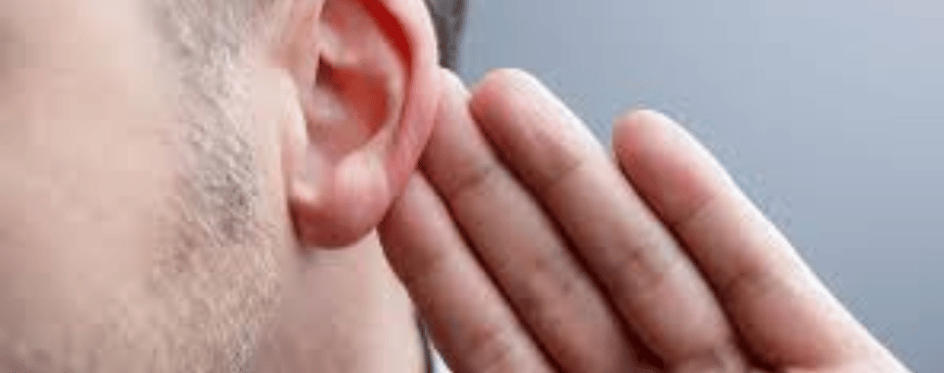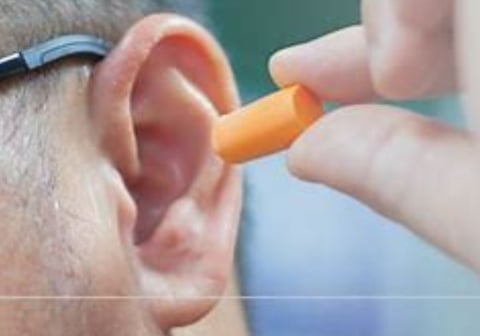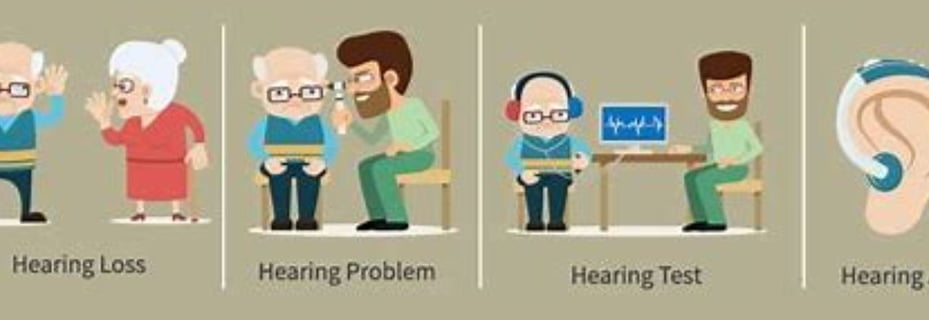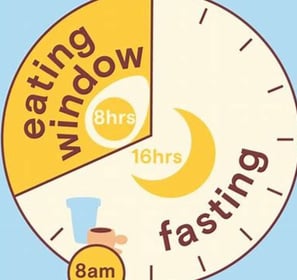
Age-Related Hearing Loss : Fasting
Learn about age-related hearing loss (presbycusis) and how autophagy and stem cells can stimulate regeneration of cells to combat this condition. Stress can also damage blood vessels, so it's impor...
EAR NOSE AND THROATS OTOLARYNGOLOGY
Dr Hassan Al Warraqi
10/1/2023


Age-Related Hearing Loss and Presbycusis: A Guide
Deafness is a hearing impairment that prevents a person from understanding speech through hearing,
even when sound is amplified. It can affect one ear or both ears and can be mild, moderate, severe, or profound.
Age-related hearing loss is the gradual loss of hearing that occurs as people get older.
It is the most common type of hearing loss, affecting an estimated 30% of adults over the age of 65.
the cause of hearing loss
The exact cause of age-related hearing loss is not fully understood, but it is thought to be due to a combination of factors, including:
Degeneration of the hair cells in the inner ear: The hair cells are tiny sensory cells that convert sound waves into electrical signals that are sent to the brain.
As people age, the hair cells can become damaged or die.
Degeneration of the auditory nerve: The auditory nerve is a nerve that connects the inner ear to the brain. As people age, the auditory nerve can also become damaged or die.
Changes in the blood vessels that supply the inner ear:
The inner ear is supplied by a network of blood vessels. As people age, these blood vessels can become narrowed or blocked, which can reduce the amount of blood and oxygen that reaches the inner ear.
Age-related hearing loss usually begins with a loss of hearing in the high frequencies.
This can make it difficult to hear high-pitched sounds, such as consonants and birdsong.
As the hearing loss progresses, it can also affect the ability to hear low-frequency sounds, such as bass and traffic noise.
Symptoms of age-related hearing loss can include:
Difficulty understanding speech, especially in noisy environments
Needing to turn up the volume on the TV or radio
Feeling like people are mumbling or speaking too softly
Difficulty following conversations in groups
Hearing ringing or buzzing in the ears
There is no cure for age-related hearing loss, but there are treatments available that can help to improve hearing.
Hearing aids can amplify sound and make it easier to hear.
Cochlear implants can be used to bypass the damaged parts of the inner ear and directly stimulate the auditory nerve.
If you notice any of the symptoms of age-related hearing loss, it is important to see a doctor or hearing specialist for evaluation.
Early diagnosis and treatment can help to improve your hearing and quality of life.
Preventing age-related hearing loss
There are a few things you can do to help prevent age-related hearing loss, including:
Protect your hearing from loud noise: Exposure to loud noise can damage the hair cells in the inner ear, which can lead to hearing loss.
Avoid exposure to loud noise from things like concerts, sporting events, and power tools.
If you must be exposed to loud noise,
wear earplugs or earmuffs to protect your hearing.
Eat a healthy diet: A diet that is rich in fruits, vegetables, and whole grains can help to protect your hearing.
These foods contain antioxidants and other nutrients that are important for hearing health.
Manage stress: Stress can damage the blood vessels that supply the inner ear.
Managing stress through exercise, relaxation techniques, and a healthy lifestyle can help to protect your hearing.
Get regular hearing checkups: Even if you don't have any symptoms of hearing loss,
It is important to get regular hearing check ups as you get older. This will help to detect any hearing loss early, when it is most treatable.
fasting intermittent fast
is hope for treatment no harm where is no hope through
autophagy stimulate regeneration of cells by the dead and damage one
stem cells magnify and regenerate the old and diseased cells
unknown mechanism may occur nobody knows
no harm but there is beneficial effect example forautophagy stimulate regeneration of cells etc
May God Almighty be pleased with him
if you cannot do islamic fasting do intermittent fast this is an alternative fasting for 16-18 hours in water or in non sugary drinks
key words
Age,related,hearing,loss,presbycusis,fasting,Deafness,autophagy,stem,cells,unknown,intermittent,fast,autophagy stimulate regeneration of cells,autophagy stimulate regeneration of cells, regenerate the old and diseased cells,Stress can damage the blood vessels ,
Age-related hearing loss, presbycusis
is a common condition that affects many individuals as they get older.
It's typically characterized by a gradual decline in hearing, especially high-frequency sounds.
This condition can be caused by a variety of factors, including changes in the inner ear structures, damage to the auditory nerve, and reduced blood flow to the ears.
But what if fasting could play a role in preventing or even reversing some of the damage
associated with age-related hearing loss?
Here’s where the concept of voluntary fasting comes into play.
Can Fasting Help With Age-Related Hearing Loss?
While age-related hearing loss is often considered irreversible, emerging research suggests that certain lifestyle changes, including intermittent fasting, may have a protective or restorative effect on hearing health.
Let’s explore how fasting, specifically voluntary fasting, might help combat the effects of presbycusis.
1. Autophagy and Cellular Repair
One of the most notable benefits of fasting is the activation of autophagy, a process where the body cleans out damaged cells and regenerates healthy ones.
Autophagy is essential for maintaining the health of tissues and organs, including the inner ear, where delicate cells are responsible for detecting sound vibrations and transmitting them to the brain.
In age-related hearing loss, the hair cells of the inner ear often become damaged or die, leading to a decline in hearing ability.
Voluntary fasting, particularly through intermittent fasting protocols (like the 16:8 or 18:6 method), can trigger autophagy, which may help:
Repair damaged cells in the ear.
Promote regeneration of hair cells in the cochlea (the part of the ear that detects sound).Reduce oxidative stress, which accelerates aging and damage to hearing cells.
While this idea is still being explored, there’s compelling evidence to suggest that autophagy could play a role in preventing or mitigating some forms of hearing loss associated with aging.
2. Reducing Inflammation and Oxidative Stress
Fasting also reduces inflammation and oxidative stress—two factors that contribute to the degeneration of hearing structures.
Inflammation in the auditory pathways and oxidative damage to cells can accelerate the progression of presbycusis.
Voluntary fasting helps reduce the levels of pro-inflammatory cytokines and free radicals, which are believed to damage tissues over time.
The anti-inflammatory and antioxidant benefits of fasting could protect the inner ear cells from the chronic inflammatory processes that contribute to hearing loss.
3. Enhanced Blood Flow and Neuroprotection
Some studies suggest that fasting can enhance blood flow and improve vascular health, which is important for the cochlear structures that require a constant blood supply.
Reduced circulation to the inner ear can worsen hearing loss, especially as we age.
By improving vascular health through voluntary fasting, the inner ear may receive more nutrients and oxygen, potentially preserving or even restoring its function.
Moreover, fasting has been shown to increase the production of brain-derived neurotrophic factor (BDNF), a protein that supports neuron growth, survival, and function.
Since the auditory nerve and brain are directly involved in processing sound, boosting BDNF levels might help protect against hearing loss caused by age-related degeneration of neural pathways.
4. Protecting Against Mitochondrial Dysfunction
Mitochondrial health is critical for cellular function and energy production, especially in high-energy tissues like the ear.
Mitochondrial dysfunction is a known contributor to age-related hearing loss, as the inner ear cells are highly energy-dependent.
Fasting has been linked to improved mitochondrial efficiency and function, which may help preserve the health of ear cells and the auditory system as a whole.
How Voluntary Fasting Works for Hearing Health
Voluntary fasting typically involves restricting food intake for certain periods of time.
There are different forms of fasting, but here are a couple of popular methods that may support hearing health:
Intermittent Fasting (16:8 Method)
This involves fasting for 16 hours and eating within an 8-hour window.
This has been one of the most studied forms of fasting, with research suggesting it can trigger autophagy, reduce inflammation, and support cellular repair.
Alternate-Day Fasting (ADF)
In this approach, individuals alternate between days of normal eating and fasting.
This method can provide deeper benefits related to autophagy and cellular regeneration, which may aid in preserving hearing function.
Prolonged Fasting (24–48 hours)
Longer fasts can significantly increase autophagy and provide even more profound benefits for cellular repair.
However, this should only be done under medical supervision, as prolonged fasting carries more risks, particularly for those with underlying health conditions.
Potential Risks and Considerations
While fasting has numerous potential health benefits, it's important to approach it cautiously, especially when dealing with chronic health conditions like hearing loss.
Prolonged fasting or extreme dietary restrictions can lead to nutrient deficiencies that may harm overall health, including hearing.
It’s crucial to ensure that your body is getting enough vitamins and minerals, especially vitamin B12, magnesium, and folate, which play important roles in hearing health.
Before beginning a fasting regimen, especially if you have any pre-existing health conditions, it’s important to consult with a healthcare professional.
They can help tailor an appropriate fasting plan and ensure you're getting the necessary nutrients to support both your overall well-being and hearing function.
Conclusion: Can Fasting Prevent or Reverse Age-Related Hearing Loss?
While more research is needed to definitively link fasting with the prevention or reversal of age-related hearing loss, the current evidence suggests that voluntary fasting could be a valuable tool for promoting hearing health.
By activating autophagy, reducing inflammation, improving circulation, and supporting mitochondrial health, fasting has the potential to protect the delicate structures of the inner ear and slow the progression of presbycusis.
If you’re interested in using fasting as a strategy for preserving or improving your hearing,
it's important to adopt a balanced approach that includes a nutrient-rich diet and regular check-ins with your healthcare provider.
In combination with other healthy lifestyle choices—such as regular exercise, protecting your ears from loud noises, and managing stress—fasting could contribute to overall ear health and longevity.
For now, the buzz is clear: voluntary fasting, when done responsibly, may just be one of the most natural ways to support your hearing health as you age.
Frequently Asked Questions (FAQs) About Age-Related Hearing Loss (Presbycusis)
1. What is Age-Related Hearing Loss (Presbycusis)?
Age-related hearing loss, or presbycusis, is a gradual form of hearing loss that occurs due to natural changes in the inner ear or auditory nerves as we age. It typically affects the ability to hear high-frequency sounds and may make understanding speech in noisy environments difficult. It is one of the most common sensory disorders in adults over the age of 50, and its prevalence increases annually.
2. What are the main causes of Age-Related Hearing Loss?
The main causes include damage to the delicate sensory cells (hair cells) in the inner ear responsible for detecting sound, changes in blood flow that supply the inner ear, and degeneration of the auditory nerves that transmit sound signals to the brain. Genetic and environmental factors, such as exposure to loud noises, can also accelerate or worsen this condition.
3. What are the common symptoms of Age-Related Hearing Loss?
Common symptoms include difficulty hearing faint or high-pitched sounds (such as voices of women and children or bird calls), trouble understanding speech, especially in noisy environments, feeling that others' speech is mumbled or unclear, the need to turn up the volume on the TV or radio, and tinnitus (ringing or buzzing in the ears) in one or both ears. Some sounds may seem annoyingly loud.
4. How is Age-Related Hearing Loss diagnosed?
Diagnosis is typically made through a physical examination of the ear using an otoscope to check the ear canal and eardrum to rule out other causes of hearing loss, such as earwax buildup or infections. A comprehensive hearing test, called an audiogram, is performed by an audiologist to assess the extent and type of hearing loss by measuring the individual's ability to hear various tones at different sound levels. Other tests, such as speech-in-noise tests and auditory processing tests, may also be conducted to evaluate other aspects of hearing function.
5. What treatment options are available for Age-Related Hearing Loss?
Currently, there is no cure for age-related hearing loss since it is primarily sensorineural. However, there are management strategies and treatment options available to improve hearing and quality of life. These options include using hearing aids to amplify sounds and make them easier to hear and understand. For severe hearing loss, cochlear implants may be an option. Additionally, training in communication strategies and lip-reading techniques can help improve understanding.
6. Can Age-Related Hearing Loss be prevented?
While age-related hearing loss cannot always be fully prevented, as it is part of the natural aging process, certain measures can be taken to reduce the risk of its progression or acceleration. This includes avoiding exposure to loud noises by using ear protection when necessary, managing chronic health conditions such as high blood pressure and diabetes that may contribute to hearing loss, and undergoing regular hearing tests to detect early changes.
7. What is the role of recent developments in biotechnology and nanomedicine in treating Age-Related Hearing Loss?
Recent advancements in biotechnology and nanomedicine are exploring new ways to treat age-related hearing loss. Research is focused on understanding the underlying pathological mechanisms, such as oxidative stress, chronic inflammation, and damage to sensory cells. Innovative drug delivery techniques, such as using bile acid-based nanoparticles, are being explored to deliver medications more effectively to the inner ear and target damaged cells. These technologies may contribute to the development of more effective preventive or restorative treatments in the future.
8. How does Age-Related Hearing Loss affect individuals' quality of life?
Age-related hearing loss can significantly impact an individual's quality of life. It can lead to difficulties in social communication, feelings of frustration and isolation, and an increased risk of depression and anxiety. In some cases, it may even contribute to cognitive decline and dementia. It can also affect personal relationships and the ability to engage in and enjoy daily activities. Therefore, proper diagnosis and management of hearing loss are crucial for maintaining a good quality of life as people age.
9. What is the potential role of nanoparticles and bile acids in treating hearing loss?
Research suggests that nanotechnology may offer new methods of delivering drugs to the inner ear to treat hearing loss. Nanoparticles can be designed to carry, protect, and transport drugs across the round window membrane to the cochlea more effectively. Their physical and chemical properties, such as size, shape, and surface charge, can be customized to enhance their absorption and distribution within the inner ear while minimizing side effects on other cells.
Bile acids, which are natural molecules involved in digestion, have also shown membrane-enhancing properties. They may be used as adjuvants in nanoparticle formulations to improve the ability of the nanoparticles to cross the round window membrane and deliver drugs effectively to the inner ear. Additionally, bile acids themselves may have potential therapeutic or protective effects on the inner ear.
10. Does fasting have an effect on Age-Related Hearing Loss?
Some evidence suggests that fasting may have positive effects on certain vital functions in the body, such as improving vascular health and reducing inflammation, both of which may be linked to hearing loss. However, scientific research on the direct effects of fasting on age-related hearing loss is still limited. Some studies indicate that fasting may stimulate cellular protective mechanisms and could offer general health benefits for the elderly, provided there are no contraindications












